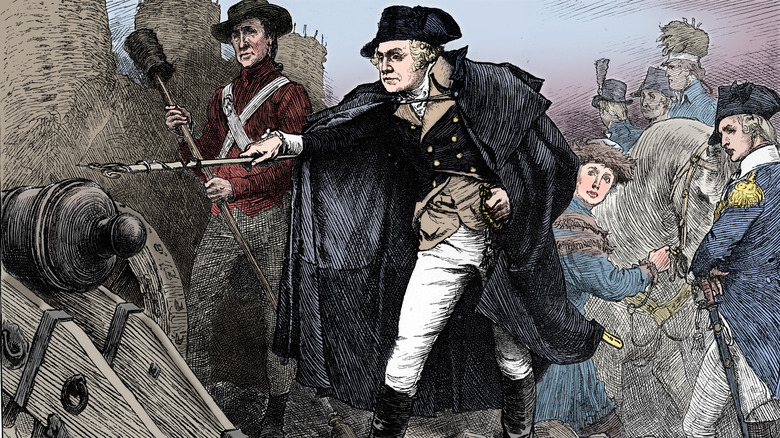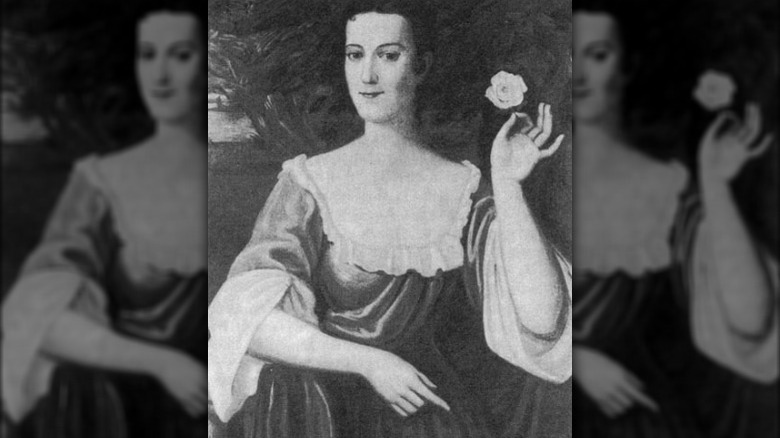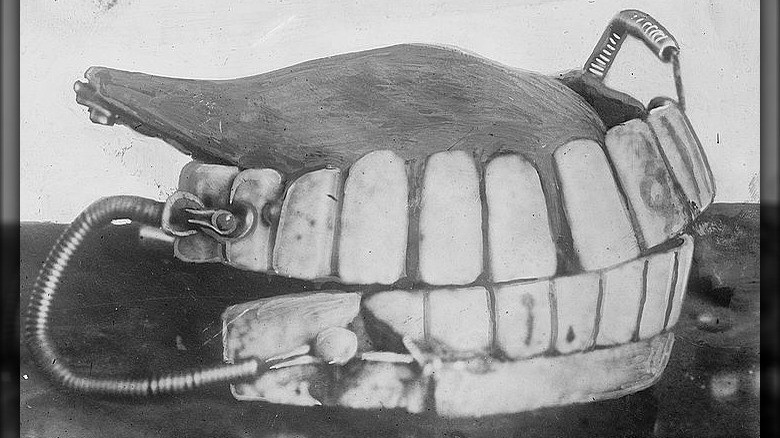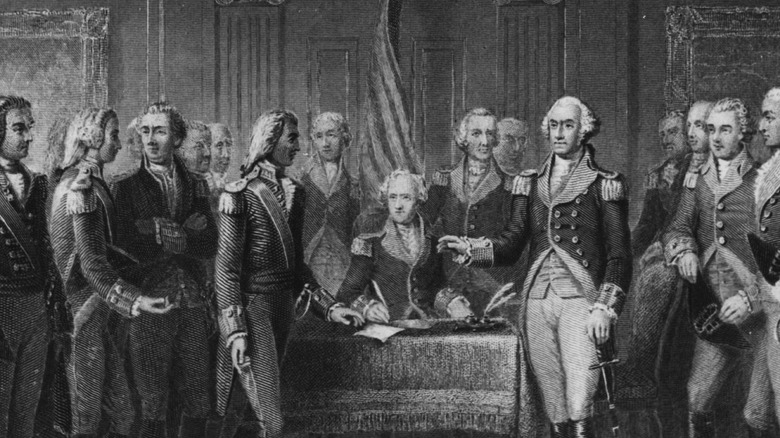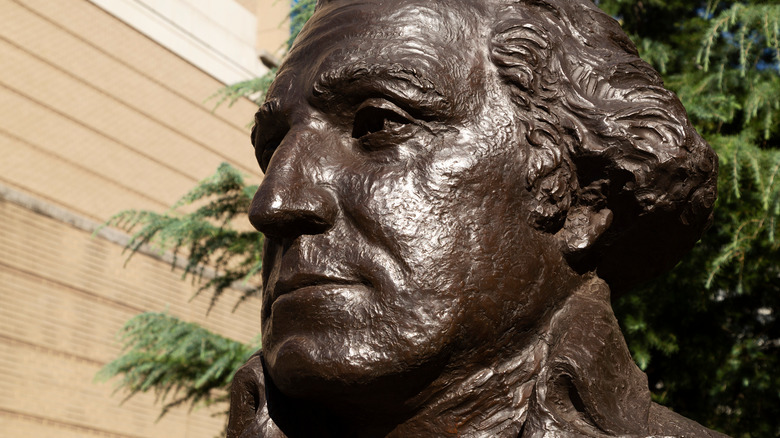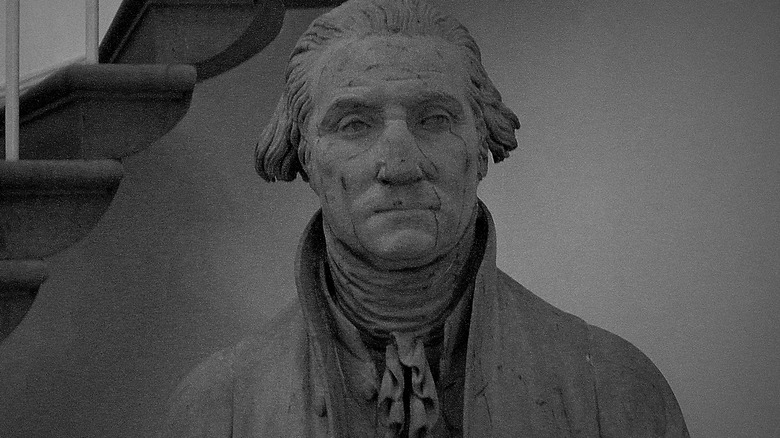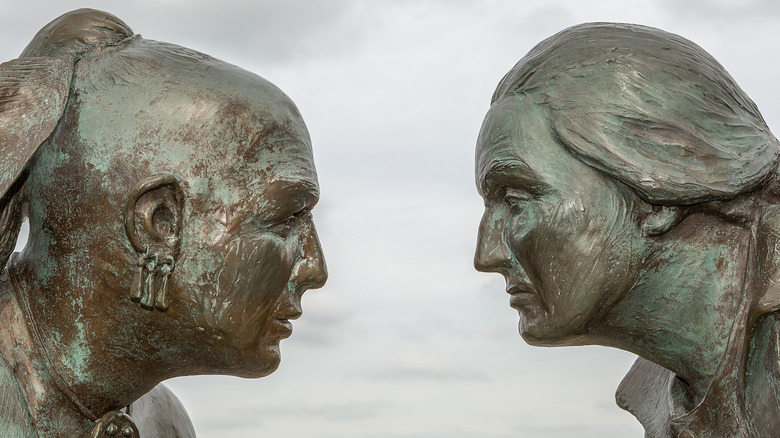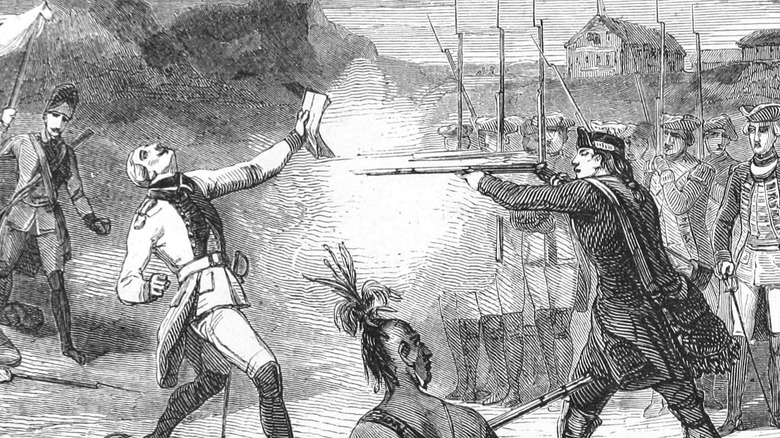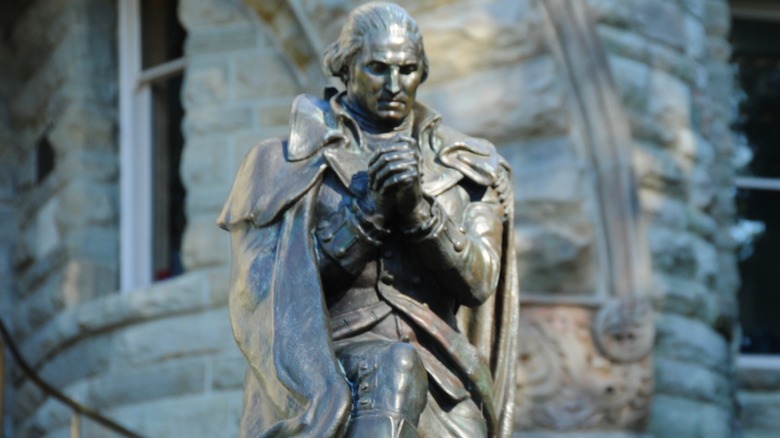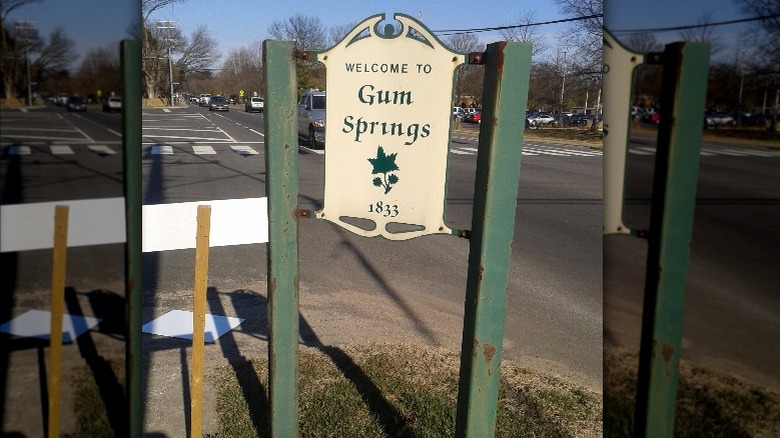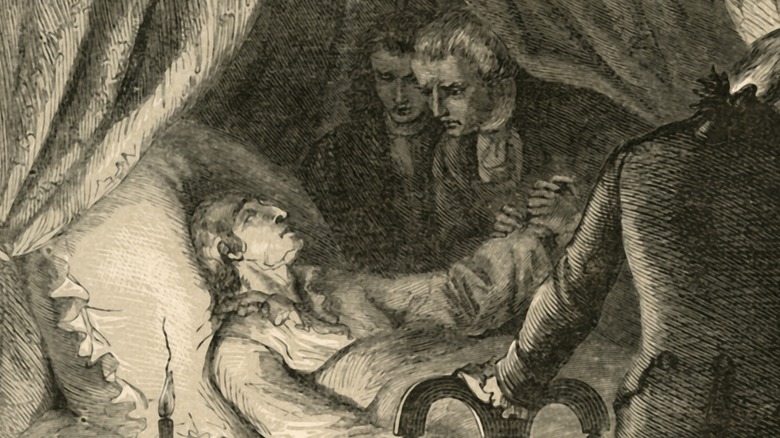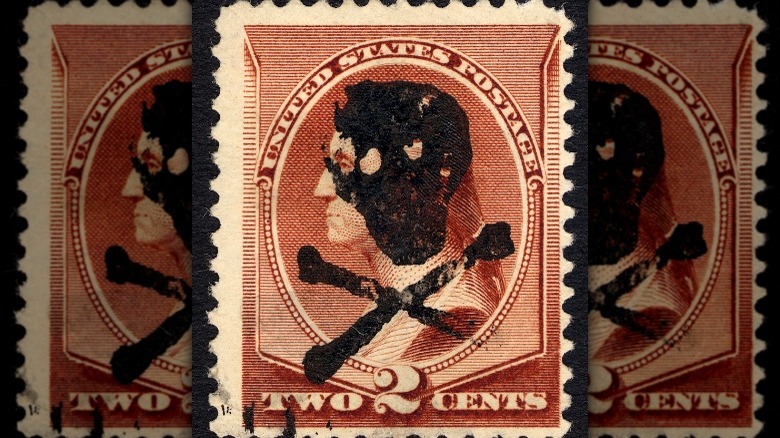Shady Details About George Washington
Few people are more revered in the U.S. American lexicon than George Washington. He was the ingenious and cunning general who overcame the most extensive empire in the world to create a brand-new, "free" nation: the United States of America. He's the first — and a reluctant first, at that — president of said nation, the founding father, a signer of the Constitution, and arguably the most important U.S. American to have ever lived, per Britannica.
When you do that much in establishing a new nation, you tend to get remembered for all of your best features. In American culture, he transcended being a mere mortal and ascended to a higher state of being, a state that many see as peerless and beyond question or reproach. The whole cherry tree tall tale, for example, is more in the realm of mythology than reality, all of which was helped by the borderline mythological "The Life of Washington" by Mason Weems, who was a tad creative in his attempted biography, according to his estate at Mount Vernon. Indeed, Washington was human, and being human, he was also imperfect. Meaning that there were definitely some things in the span of his storied life that may get pushed aside, or casually ignored, to prop up the image of something bigger and better than any human could possibly be.
Nothing can take away all the great things Washington did for the United States of America, but the dude had some shady details about his life too. Let's dig into those.
He was in love with a married woman
Most anyone who has heard of George Washington has probably also heard of his wife, Martha. As the original first lady in United States history, she carries a pretty sterling reputation as well, even if she and George never bore any biological children themselves. She did bring over children from her previous marriage that the first president raised as his own, but through it all, it's very possible that Washington's heart always belonged to another — Sally Fairfax.
Fairfax, the wife of Washington's good friend prior to his run as a Colonial hero, had shown him the ropes of navigating the upper class and aristocracy around the colonies, so as to fit in with the who's who of the eastern seaboard. But for Washington, his relationship with Sally Fairfax was more than just a learning experience, according to American Heritage. It was at least a one-way love, with Washington having feelings for her before her marriage and, controversially, after his own marriage to Martha.
In the last letter Washington ever wrote to her, according to his estate at Mount Vernon, Washington confessed to the happiest years of his life being the ones he spent in her company. Oddly enough, this letter was co-written by Martha, who had also enjoyed the company of the Fairfax family. While that doesn't technically make it a love triangle, it's pretty close.
Some of his false teeth may have come from enslaved people
Among the great myths surrounding George Washington — such as the chopping down of the cherry tree — is what his teeth were actually made of. Washington had storied dental problems his entire life, despite dedicating much time and attention to the wellbeing of his chompers. But not even proper hygiene and care could keep those teeth in his mouth, and it became necessary for him to invest in dentures. Rumors have since blossomed that they were wooden teeth, but that isn't entirely true. In fact, his teeth were quite the mixture of things, the least flattering of which being the pulled teeth of enslaved people.
According to his estate at Mount Vernon, among Washington's documents to have survived into modernity is a receipt, documenting his purchase of nine teeth from exactly that less-than-savory source. And while this does seem to be particularly cruel and gross, Washington's estate points out that this has been a common practice since the middle ages, with the poor selling their teeth to dentists for a decent price — sometimes they were even taken from corpses.
Given that Washington only had one of his own teeth left in his mouth, according to Live Science, there were likely more than a few human teeth in his gums that didn't come from his own body.
He used liquor to sway voters
There is one shady detail that ol' George Washington may deserve a pass for — mainly because he tried to play the game right, be honest and forthcoming, and not indulge in any of the underhanded political schemes that existed long, long ago. In the end, though, he discovered that the only way to win the game was to more or less cheat, since everyone else was doing it too. That's what he did, and it may well have launched his political career.
Long before Washington was a presidential candidate, back when he was just 24 years old, Washington ran for a seat in the House of Burgesses and lost handily. According to "Last Call: The Rise and Fall of Prohibition," by Daniel Okrent, Washington blamed the fact that he had refused to provide alcohol to his voter base. Naturally, his political opposition had merrily lubricated the innards of the voters. Two years later, Washington ran for office again, this time with 144 gallons of everything from rum to beer, and he won very easily.
You might therefore say that Washington only entered politics in the first place thanks to participating in the illegal practice of bribing his voters with a bit of the sauce. But then again, it appears that pretty much everyone was doing it.
He failed to free his estate's enslaved people
One of the most significant ongoing discussions surrounding the founding fathers is their use of slavery, and how much they benefitted from it. Sure, these were the families responsible for creating this nation, but the question remains of how much of it was due to their exploitation of human beings. No matter how well anyone treated their enslaved people, it doesn't hide from the fact that they were still enslaved. And while George Washington did see his views of slavery change over the years, to the point where he believed it should be abolished, he still profited from the institution of slavery.
That said, towards the end of his life, he worked tirelessly to secure his enslaved people's freedom, according to HistoryNet. It is widely known that Washington, in his will, freed the enslaved people that were legally bound to him, but many were enslaved by Martha and the estate, and thus not his to free at all. Despite his efforts at selling off his own land to compensate for the proposed freedom granting, nothing worked, and, in the end, many of those enslaved at Mount Vernon remained as such after the first president's death.
He is the king of library late fees
No one can escape library late fees, not even the first president of the United States. On October 5th, 1789, George Washington checked out two books: "The Law of Nations" by Emmerich de Vattel, and Volume 12 of "Commons Debates," according to The Week. The librarian signed them out to, rather simply, "President." Less than a month later, the books were due, and Washington made attempt to return them. From November 2nd, 1789, the fines began to mount. Two-and-a-half years later, the first book recording his fines — now weighing 18 pounds — is retired and subsequently goes missing.
Fast forward to 1934, and the ledger is found in the library's basement, with no record of Washington ever having returned the book to its rightful place. In 2010, it was confirmed that Washington never did return his library books, because Volume 12 of "Common Debates" turned up — and not in the library. With the fines now amassing $300,000 and Washington long dead, it seemed that all was at an impasse.
Mount Vernon, however, had other ideas. While they couldn't find the copy of "The Law of Nations," they did manage to purchase another for $12,000 online, which they then donated to the library, leading to the absolution of Washington's fines.
He forced Native Americans to join the US or die
As the most iconic figure in American history, George Washington is a tough man to criticize. Even when it comes to his dealings with slavery, his about-face later in life, ending with his attempts at early abolition, offers a glimmer of hope that this "of the times" man had seen the error in his ways. There is another theater of cruelty, however, that doesn't offer as much of a glimmer, if it offers one at all — that of the Native Americans, and the horrid treatment they received (and continue to receive) at the hands of the United States government.
While the colonial United States was still in its fledgling state, the Native Americans were the top dog, according to Zocalo. Meaning that Washington had to get creative to steal their land from them. While Washington noted that part of his goal in acquiring Native American land was to find a mutually beneficial relationship with the various tribes in the area, that goal rarely ever received any visitation whatsoever. Washington offered to buy Native American land in honest transactions, but if they refused, Washington vowed to fight them off their land and take it anyway. He made such a habit of this brutal policy that the Iroquois referred to him as "Town Destroyer."
He started a war all by himself
George Washington often has his formative days glossed over, despite being celebrated for his original thinking, cunning, and steadfastness in the "American way." His mind evolved ahead of its time, and his military prowess was so esteemed that he commanded a rag-tag militia to victory over the most fearsome empire in the world. At least, that's how it's most often told.
Before all that, though, Washington made his mistakes and missteps. One of which involved sparking an international war all on his own. At just 21 years old, a young army major named George Washington was sent into Ohio territory to face the French, according to the estate at Mount Vernon. However, as History points out, Washington had never seen combat before, and he was accompanied by a veteran Native American warrior named Tanacharison, who likely had Washington wrapped around his finger. Seeing land he wanted for his people, Tanacharison instigated the conflict by pushing Washington into a skirmish with the French, leading to the conflict that began the French and Indian War. In one account, via History, it was Washington who fired the first shot.
His religious beliefs are hazy
Religion was something of a coy subject for George Washington, either because he didn't want his beliefs known, or because he didn't adhere to any of the cookie-cutter organized religions of the time, or a mixture of both. Whatever the case, George Washington's spirituality is not as easy to pin down as many of his contemporaries.
During the Revolutionary War, according to Mount Vernon, Washington attended services alongside his fellow military men. But in a fantastic example of the separation of church and state, Washington's religiosity changed a bit when he entered office. While he sought to protect the religious freedoms of all religions, Washington only attended church about once a month, when he settled back into life at Mount Vernon post-presidency. He was also ambiguous in his writings over details of his personal religious beliefs.
While Washington was declared an Anglican by his estate at Mount Vernon, he was also a Freemason, which shares some of the same core principles (via Mount Vernon) such as a belief in the afterlife. His dedication and active membership in the Masons, along with some of the disdain he showed towards some Christian church rituals (such as avoiding communion and ducking out of church early) have led to speculation that he was more of a deist. Nonetheless, according to George Tsakiridis of South Dakota State University (via Mount Vernon), trying to categorize Washington's religion requires an appreciation for the complex and nuanced nature of his spirituality.
He may have had a child with an enslaved person
In what would be the tabloid flavor of the week nowadays, George Washington had a potential scandal himself back in the mid-1780s. According to descendants of the child himself, via the Independent, Washington had an affair with an enslaved woman named Venus, who belonged to the widow of Washington's brother. The child's name was West Ford, and The New York Times dug into these claims to check their veracity. The family maintains that Ford was treated favorably in the Washington household all his life because he was, in fact, the former president's illegitimate son.
Piling on the proof, Ford was given 160 acres of land by Washington's ancestors, which was not exactly a common practice back then. Ford would use that gift to establish Gum Springs, a town of formerly enslaved people who had been granted their freedom. George Washington's estate denied all the claims, fortifying their stance around Washington having fathered no one.
A doctor almost tried to resurrect him
In this one, George Washington bears no fault. Well, not much fault, anyway. According to Mount Vernon, the story goes that in 1797, Martha Washington made mention of an agreement that her husband had entered into with a handful of other men, all of whom agreed not to die before 1800. Naturally, Martha saw no reason to worry about her dear George, yet sure enough, just 17 days shy of 1800, Washington did, in fact, die. Surprising or not, he breathed no more.
At the time, there was great concern about burying people alive, which would have been an awful end for the great George Washington. So they let the body sit there for another couple of days, just to be sure he was actually dead. When Washington was still alive, Dr. William Thornton was invited to the home to try his luck at curing him, but Thornton arrived too late. He also, however, had a backup plan that involved step after step of detailed instructions on how to bring Washington back to life. He even proposed this idea to all those gathered, but no one was a fan of it, so he never had the chance to try it.
He was one of the richest presidents ever
It's often said that no one becomes the president of the United States for the money. After all, while U.S. presidents make a comfortable sum of money ($400,000 a year, plus $50,000 in expenses, according to Reader's Digest), they are by no means the top of the capitalist pyramid in America. And while there have obviously been pay raises in the presidential earnings, from $25,000 in 1789, to $400,000 in the 2020s, the other factor that changes the spectrum a bit is how much America as a nation is making.
In 1789, George Washington's salary was 2% of the budget of the United States of America, according to The Christian Science Monitor, which is simply unthinkable nowadays (considering modern-day figures now run into trillions of dollars). In addition, Washington was a considerably wealthy landowner, with close to 60,000 acres to his name — including 8,000 acres of prime farmland along the Potomac river. Altogether, and adjusted for inflation (as of 2022, per the Bureau of Labor Statistics), this puts Washington at an estimated $678 million net worth, which makes him one of the richest Americans ever — let alone presidents — by quite a healthy margin. Behind him on that list, despite his substantial debts, is Thomas Jefferson at $274 million.
